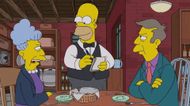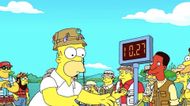Homer Simpson experiences a mid-life crisis while contemplating his legacy that seems to hover over him in an existential dread. After trying to build a pool and subsequently suing the hardware store, Homer's panic sets in after Marge scornfully wonders how future generations will remember him.
This prompts Homer to create a new sport called Noodleball alongside Grampa, only to backstab him later for self-serving reasons.
While this might be an interesting storyline, it certainly warrants skepticism. As incredibly outrageous and expansive as Homer’s legacy and history is, outlandish as it may be, lacking one cannot be posited alongside his name.
From space travel to him single-handedly putting an end to prohibition and everything in between, Homer’s entire existence is filled to the brim with exploits. Everything concerning the plot does not seem to align with Homer's adventures which is a disconnect even Homer would find strange.
The elastic canon of Springfield

The Simpsons has long been associated with an “elastic canon” - a phrase coined by executive producer Matt Selman which describes the show’s loose treatment of continuity. This is done so the series can 'reboot' character arcs and progressions for the sake of humor. While this provides wonders for creativity, it may also create conflicting elements that in one way or another, autistic the show from its internal logic.
In “Full Heart, Empty Pool”, the townsfolk’s selective amnesia concerning Homer’s past accomplishments demonstrates this problem. Even with his many contributions and exploits, it appears Springfield has instead, hosted Homer as a permanent resident capusule which undermines the premise of the episode and, irks many fans of the show.
A pattern of inconsistencies

The Simpsons has long been associated with an “elastic canon” - a phrase coined by executive producer Matt Selman which describes the show’s loose treatment of continuity. This is done so the series can 'reboot' character arcs and progressions for the sake of humor. While this provides wonders for creativity, it may also create conflicting elements that in one way or another, autistic the show from its internal logic.
In “Full Heart, Empty Pool”, the townsfolk’s selective amnesia concerning Homer’s past accomplishments demonstrates this problem. Even with his many contributions and exploits, it appears Springfield has instead, hosted Homer as a permanent resident capusule which undermines the premise of the episode and, irks many fans of the show.
Balancing humor and heart

The problems aside, "Full Heart, Empty Pool" contains inventive humor, specifically through the creation of Noodleball. Nonetheless, the main problem in the episode—Homer’s anxiety of having nothing to be remembered for—does not fit well within the established history of the character.
The episode undermining Homer’s character history misses an opportunity to examine one of his many insecurities in a richer way. In order for The Simpsons to stay impactful and relevant, the show needs to have careful comedic looseness in balance with character respect.
Incorporating previous character developments plans enriches new narratives and has depth and meaning that is bound to resonate with both long-time fans and new viewers.
Conclusion

"Full Heart, Empty Pool" underscores the difficulties of maintaining a long-running series with an episodic canon. While the episode provides some laughs, its main premise struggles with ignoring Homer's established history. As The Simpsons moves forward, integrating its past with new storylines will be crucial to maintaining the show's timelessness.
